Dreamgirls
 for language, some sexuality and drug content.
for language, some sexuality and drug content.
Reviewed by: Sheri McMurray
CONTRIBUTOR
| Moral Rating: | Offensive |
| Moviemaking Quality: |
|
| Primary Audience: | Adults Teens |
| Genre: | Musical Drama Adaptation |
| Length: | 2 hr. 11 min. |
| Year of Release: | 2006 |
| USA Release: |
December 25, 2006 (wide) |
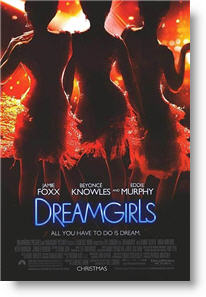
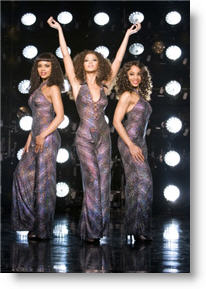
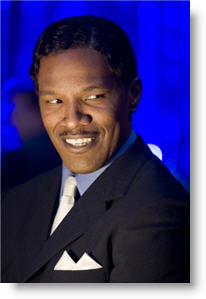
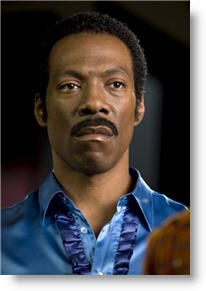

Music in the Bible
Should I save sex for marriage? Answer
How far is too far? What are the guidelines for dating relationships? Answer
How can I deal with temptations? Answer
What are the consequences of sexual immorality? Answer

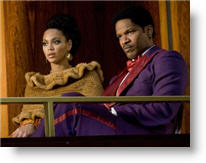
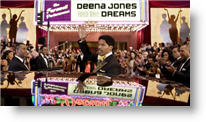



| Featuring |
|---|
| Jamie Foxx (Curtis Taylor Jr.), Beyoncé Knowles (Deena Jones), Eddie Murphy (James 'Thunder' Early), Danny Glover (Marty Madison), Jennifer Hudson (Effie White), John Krasinski (Sam Walsh), See all » |
| Director |
|
Bill Condon—“Kinsey” (2004), “Gods and Monsters” (1998), “Mr. Holmes” (2015) |
| Producer |
|
Patricia Whitcher Laurence Mark |
| Distributor |
“Fame Comes And Goes, Stars Rise And Fall, But Dreams Live Forever”
“DreamGirls” generated ticket sales of $8.7 million as it expanded on Christmas Day 2006 to a national roll-out after opening to a limited engagement starting December 15th.
That tally was enough to land “DreamGirls,” at the No. 2 spot in the Christmas Day 2006 box office race.
Starring Jamie Foxx, Eddie Murphy, Beyoncé Knowles and newcomer Jennifer Hudson, “Dreamgirls” scored seven nominations this month for the Broadcast Film Critics Association awards and five nominations for the Golden Globes, making it a serious contender for the film industry’s highest honor—Oscar!
Set in 1963 Detroit in the verging beginnings of R&B music and on into the music scene of the 1970s, “DreamGirls” takes the audience on a roller coaster ride of familiar music history. While the names have been changed, the references are unmistakable to Motown music stars such as B B King, The Jackson 5, and most obvious, The Supremes.
Teen and green girl group “The Dreamettes” enter the Detroit Theater’s “Star of Tomorrow” competition in hopes of stardom. They have been together since they were twelve and have become as adept at sneaking out of the house to go to shows as they have at polishing their raw talent.
This night their singing lives and personal lives are destined to change forever.
Backstage after another loss at competition, the three girls are about to give up when they meet up with an ambitious Cadillac dealer named Curtis Taylor, Jr. (Jamie Foxx)—Deena Jones (Beyoncé Knowles) and Lorrell Robinson (Anika Noni Rose)—are thrilled at the prospect of singing back up for regional R and B star, James Early (Eddie Murphy), but full-figured lead singer Effie White (Jennifer Hudson) will have nothing to do with ‘back up.’ She considers her voice better than that and that singing back up is a trap she will not get herself or her friends into. Curtis melts Effie’s heart with flatteries, a promise to put her voice up front soon enough, a steady gaze and the bound-to-let-you-down phrase, “Trust me.”
Curtis believes in this singing combination so much that he sells off his Cadillac dealership, does some high rolling, and puts all his cash into a cross country tour. Also along on the tour are Effie’s extremely talented song writing brother C.C. (Keith Robinson) and Jimmy’s long time manager Marty (Danny Glover). Soon James “Thunder” Early and The Dreamettes are a tremendous hit. Off of this huge success, Curtis is able to start his own record label, Rainbow Records, as everyone involved works together towards a common goal—stardom!
Calamitously the womanizing and married Jimmy Early woos the innocent Lorrell and finally wins her. Curtis sees trouble brewing over this adulterous affair. At the same time Effie is becoming increasingly infatuated with the slick-talking Curtis. Trying to stay on top of the business, Curtis knows it is time for a change.
The extremely winning combination of Jimmy and The Dreamettes are now at the top of the Billboard charts and headlining at the Apollo Theater. Backstage Curtis announces that the group needs a new image and separates The Dreamettes from James “Thunder” Early while they all seem to be at the top of the game. Curtis is determined to push the girls even higher up on the musical stardom ladder. He really doesn’t care who he steps on or who’s career he damages on the way to the top.
C.C. is a talented song writer and choreographer, who puts together some of the top R and B songs on the charts, but as the times really were, his top black audience favorites get picked up by less talented white producers who remake them into marred, watered down versions of his full bodied, soulful renditions. So C.C. goes to Curtis for advise and together they devise a plan that will, they think, help out everybody’s ambitions and still keep up with the changing mood of pop music.
The decisions made by the relentless Curtis now are the turning point to despair and eventual break down of the close knit structure of these characters. Up to this point they have been as a family, doing what they supposed to be best for them all, but with the turning tide of the 70’s pop-disco scene a new monster rears it’s head—greed.
Feeling that Effie’s voice is too “churchy” and her figure too large to attract white audiences, Curtis appoints the slimmer Deena as the lead singer of the Dreamettes. Although Deena rejects his proposal, Curtis makes it clear his decision is final. Effie is once again hurt by being reduced to Deena’s back up, even though they all know her voice is the one that really shines.
With the aid of new songs and a new more glamorous image, Curtis and C.C. transform The Dreamettes into The Dreams, a top selling pop act whose popularity rivals all popular groups of the day.
The betrayed Effie does not take kindly to being reduced to Deena’s backup and becomes even more unruly when Curtis’s affections also start to turn towards Deena. When Effie, feeling ill, does not turn up to rehearse for The Dreams' debut at Ceasar’s Palace in Las Vegas, Curtis abruptly replaces Effie with his secretary, Michelle Morris (Sharon Leal). Effie, who states she has just seen her doctor and “everything is fine now,” arrives at dress rehearsal just as Michelle does, and after a nearly violent argument, finds herself without her group and without Curtis.
Jennifer Hudson’s performance of ‘And I Am Telling You I’m Not Going’ is the emotional show stopper from the original 1981 Broadway show of “DreamGirls”. According to Newsweek:
“…when moviegoers hear Hudson sing, she 'is going to raise goose bumps across the land.’ I can’t agree more. As far as performances in ‘DreamGirls’ go, Hudson’s outshines them all musically and dramatically.”
At this point in the Broadway production, we enter into Act II, in the movie it is an eight year leap into the 70’s and leaves the audience wondering “where’s Effie?” If you didn’t see the Broadway edition, this might be a bit confusing. It is at this junction, the movie production gets a little long and not as tight as the preceding “Act I” of the 60’s.
Deena and Curtis are married, Jimmy just can’t seem to leave his wife for Lorrell, Rainbow records has moved to Los Angeles where it has prospered off of Deena Jones and The Dreams, and even though publicly everything looks luscious, internally all is falling apart. It seems without Effie, the “dream” cannot survive no matter how tight the fist of Curtis grips.
Effie has dropped out of music all together, is on welfare and living in the burnt-out inner city of Detroit. Even though her brother, C.C., continues to reach out to Effie, she stubbornly ignores the letters and money he sends. Until one day she decides to swallow her pride and goes to Marty for help. Then Marty, C.C. and Effie work together to produce her comeback single “One Night Only,” which enjoys a healthy radio play.
I do not want to post any spoilers here, for “DreamGirls” is a movie with reconciliation, inspiration and a bittersweet, if not happy ending—how it reaches that point is for the viewer to enjoy. It is a tale of how the music industry and the entertainment industry in general can chew up a soul who isn’t grounded in a spiritual strength in God. How greed and corruption mangles the mind and heart. For some it is a place to give to others, but to too many others it is the place where selfish desire flourishes.
The PG-13 rating is a bit misleading, but fair as there are no other in between ratings for the borderline content in “DreamGirls.” Parents and any children under age 16 should be cautioned as to the very adult content story wise.
Sex before marriage is viewed as normal (as was in the young culture of the 60’s and 70’s as the Hippy era was dawning). An 18 year old character states she is all grown up now (because she has had sex,) and that there is nothing wrong with that, “…it’s not wrong when you love someone.” In God’s eyes, it is wrong if the couple is not married. There are two scenes where a couple are shown in bed, perspiring and kissing, not actually shown making love, but the references are very strong. A main character has a child out of wedlock. Also a point to discuss with teens and tweens. God has ordained that celibacy before marriage is holy and right. A sexual relationship between a man and a woman should only take place after marriage and then producing children. (Note here that a great teen film to watch on this subject is “Echoes of Innocence”.)
There are two scenes where the James Early character is shown cutting rows of cocaine (but not shown snorting it) and the other where he is shown rolling up his sleeve to take Heroin (but not shown injecting it). These are also strong references to his drug addiction and this issue should not go without a talk with teens and tweens who see this film. Drugs are and always has been a driving force in show business and the music business in particular. For my generation alone, too many truly gifted musicians have died from drug over doses—Jimmy Hendrix, Janis Joplin—are two that are of note. Without God to give guidance and hold onto in our lives, how much is wasted on empty passes at happiness. Even though it has made it look ‘cool’ in the past, Hollywood is finally showing that drugs and the addictions to them only end in death and hopelessness. Only Jesus can fill the void and bring everlasting contentment.
An adulterous affair which lasted eight years is ignored by everyone and never questioned by these characters. It is treated as a comical moment when the wife and the mistress finally discover one another. Characters are shown drinking and gambling. The James Early character dances in a suggestive manner and drops his pants on stage (to reveal his boxer shorts). Lust and greed are the main elements of the Curtis Taylor character’s misery. God is never once mentioned as the healer and hope for all the despair these characters endure.
There is also some foul language such as 3 “sh*t,” 2 “a**,” 1 “black a**,” 1 “kiss my a**,” 1 “bull sh*t,” 1 “f-word,” a singer shouts, “Sweet Mother of Jesus,” and although God’s name is not taken in vain there are several references to the profane. I believe the screenplay makes the characters speak in the language used in the day, but as a Christian, I never like to hear profane language and I feel any story can be produced without the f-word.
After all the above mentioned negatives, there are many positive statements to be made of “DreamGirls.” The one most evident is the score by Tom Eyen, with music by Henry Krieger. They make the nostalgia of the 60’s and 70’s come alive on screen. Although some Christians will stay away from R and B and even rock music, there is still a place for it in musicals today. Music and lyrics are suppose to tell a story or bring out an emotion with the poetry of the words. This early type of music did that. I cannot think of many modern songs that ignite as much as those early days of rock, pop and R and B. I am glad that Christian composers use this medium today to bring teens to Jesus
John Lennon and Paul McCartney said that even though they had a hard time talking about the deaths of their Mother’s they found they could communicate through their music. If anything, God has made music a common ground through which we all can connect. Christian contemporary, pop and even alternative Christian music just kicks it up to a higher plain!
Even though there has been much talk about the similarities between the characters in “DreamGirls” and real life music legends like Aretha Franklin, Berry Gordy, James Brown, Smokey Robinson, Mary Wilson and most evident: Diana Ross and the Supremes, this is not a musical about them. It is instead a testament to the early roots of R&B and Rock 'n' Roll. To Alan Freed’s Rock and Roll Party who stayed true to the black roots of the music rather than to the more white, “American Bandstand”. To the original Moonglows who started the smooth sound of “Sincerely” that stayed 20 weeks on the top charts before it was picked up by The McGuire Sisters. And to Frankie Lymon and The Teenagers, who in 1956 recorded “Why Do Fools Fall In Love.” Their style helped form such greats as Smokey Robinson and The Imperials, The Jackson Five and The Supremes.
It is a story full of “soul” and heart. Although Effie wants to do it her way, and fights to use her own voice, and even appears selfish in the beginning, she learns the hard way that friends and family mean so much more than fame. By listening to her heart, I would like to think she found a little bit of God in it and transferred that into her voice.
The lyrics strain, “All those years in the park can make a person blind, I need a friend to start over again—I’m gonna leave my past behind.” That sounds like a cry for the friendship of Jesus—the friend who will never leave us or let us down.
“DreamGirls” is directed by Bill Condon from a screenplay he adapted from the stage musical’s original book by Tom Eyen. An Academy Award winner, Condon received another Oscar nomination for his screenplay adaptation of “Chicago.”
Much of the dialog in the “DreamGirls” stage musical is sung rather than spoken; for the film version, Condon replaced much of the sung dialog with spoken lines. I think this was a mistake. The ‘song’ dialogue hit me much more powerfully than any of the spoken interactions between these characters.
“DreamGirls” is a fantastic musical and more. The music speaks volumes more than the dialogue and it is the electric emotions that this music evokes that rivets the viewer to his seat. These performers are able to inject their singing with passion and conviction, much as the young Aretha Franklin and legendary James Brown, who has gone on to meet The Lord this past Christmas Day.
If you like good music, yeah yeah, that sweet sounded R and B music, yeah yeah… then you’ll be thrilled with “DreamGirls.”
Little Known Facts
- The term rhythm and blues was originally coined in 1949 by Jerry Wexler.
- A hot tempered woman, like Effie, Aretha Franklin was arrested in Detroit in 1969 for disturbing the peace.
- Golden Globe award winner and “American Idol” alum, Jennifer Hudson, had to put on twenty pounds for this role.
Violence: None / Profanity: Moderate / Sex/Nudity: Moderate


Average / 5
Average / 5
Better than Average / 4
Offensive / 5
Offensive / 3½
Offensive / 2½
Very Offensive / 3
Good / 4
Average / 3
Overall, I found this film to be incredibly disappointing. Recommended only if you’re a fan of Beyoncé or Bill Condon, otherwise, avoid it.
Average / 3


My Ratings: Excellent! / 3½